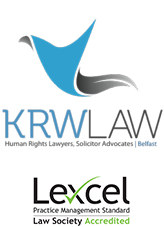Press Release: Mother And Baby Home Report
KRW LAW LLP (KRW) represents a number of people, including members of survivor groups, who gave evidence to the Mother and Baby Homes Commission of Investigation.
Today the Irish government has published the Final Report of the Mother and Baby Homes Commission of Investigation.
The Report is 2865 pages. It was published without prior consultation with victims and survivors.
Analysis of the contents of the Report will take time but there is an Executive Summary of 76 pages. The online Report cannot be interrogated electronically. However, we note that regarding Recommendations:
“13. Redress can be financial or can be in the form of enhanced services. The Commission considers that services such as counselling and enhanced medical cards should be made available to those former residents who need them. It also wishes to make clear that many, probably most, former residents are managing their lives very well and it should not be assumed that they are in need of dedicated State support.”
This is in contrast to the Recommendations of the Historical Institutional Abuse (HIA) Inquiry.
The work of the Commission did not investigate Mother and Baby Homes in Northern Ireland. KRW has made submissions to the Department of Health that a human rights compliant investigation into Mother and Baby Homes in Northern Ireland should now be established. The issue was out-with the Terms of Reference of the HIA Inquiry.
Stormont introduced an Inter-Departmental Working Group (IDWG) on Mother and Baby Homes, Magdalene Laundries and Historical Clerical Child Abuse in 2017.
The IDWG has been criticised by UN Convention on the Elimination of all Forms of Discrimination against Women (CEDAW):
“The IDWG cannot demonstrate independence. Even though it has an independent Chair (although a former member of the RUC/PSNI) the other members are not independent as they are representatives of the administration”
The Commission of Investigation was not conducted in accordance with ECHR standards of compliance. Its work was criticised by CEDAW, the Commissioner for Human Rights of the Council of Europe, the UNHCR, Irish human rights and civil liberties organisations and by victims and survivors.
For example, there is only one mention in the Report of the controversial medical procedure of symphysiotomy.
“Prior to the establishment of this Commission, the Irish Human Rights Commission (now the Irish Human Rights and Equality Commission) told the Government that ‘it is critically important that any such investigation should take place within a human rights and equality framework and in particular that it conforms with the State’s human rights obligations under the Constitution and under international human rights law’. The Irish Government did not opt for that approach in its mandate to the Commission.”(36.2)
The Commission states:
“36.80. There are no clear absolute rights.”
Article 3 of the ECHR is absolute right.
The Irish government has therefore failed to discharge its positive investigatory obligations as demanded under the ECHR, specifically regarding the right to life (Article 2), the prevention of inhuman and degrading treatment (Article 3) and the right to private life (Article 8).
This Report exposes the human rights deficit in the Republic.
The work of the Commission was a lost opportunity which may now give rise to litigation on behalf of victims and survivors. This may include requesting the Attorney General to direct inquests into the Tuam Burials and the other 9,000 deaths of children (15% of all child residents).
In Northern Ireland, the work of IDWG now faces similar challenges, unless Stormont insists that its work is human rights compliant.
[i] Final Report.pdf (mbhcoi.ie)
[ii] Extract from the HIA:
“Although there were a number of references by witnesses to their experiences, or the experiences of others, when working in laundries in the three institutions we have investigated, the Inquiry has not engaged in a wider investigation into what are commonly called Magdalene homes or laundries, or mother and baby homes. Because such institutions contained adults over the age of eighteen, and as our Terms of Reference confine us to examining residential homes or institutions for children under eighteen, the experiences of people in such institutions who were over eighteen are outside our Terms of Reference. Whether their experiences should be investigated is a matter for the Northern Ireland Executive and the Northern Ireland Assembly”
Symphysiotomy is an outdated surgical procedure in which the cartilage of the pubic symphysis is divided to widen the pelvis allowing childbirth when there is a mechanical problem.



